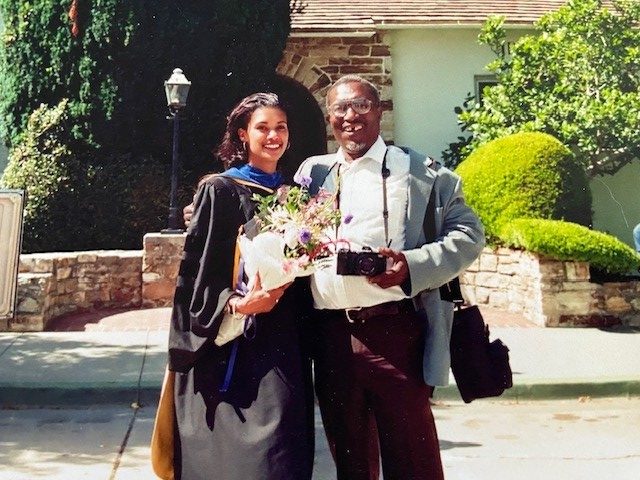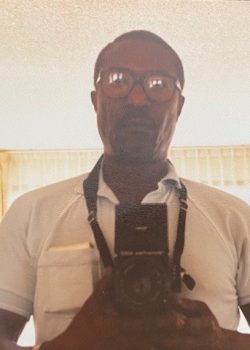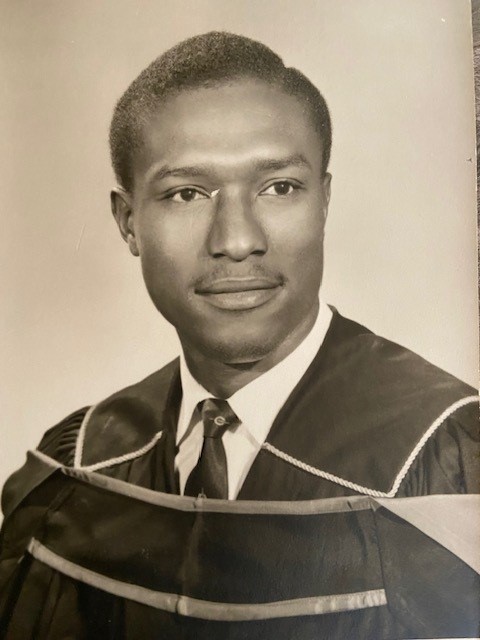
Delia Douglas at her PhD graduation with her father, Lawrence Fitzroy Douglas
Reflecting B(l)ack and moving forward: A legacy of a life well lived
My father, the late professor Lawrence Fitzroy Douglas, accepted a position in the department of sociology at the University of Manitoba in 1967. He was the first Black faculty member in the department and one of its four founding members. He taught there for 22 years until his retirement in 1989. Notably, the department would not hire another tenure track Black faculty member for 32 years.
I established the Dr. Lawrence F. Douglas Fellowship to pay tribute to my father’s legacy and to acknowledge his simultaneously unique and familiar biography which is linked to the Caribbean’s history of colonialism, village life, and the complex journeying that defines Black life in the diaspora. This fellowship will be awarded for the first time during the upcoming 2024-25 academic year.
Great expectations

Lawrence Fitzroy Douglas, self-portrait, 1970s
My father was born on January 17, 1927, in Mount St. George, Tobago, one of two Caribbean islands that make up the Republic of Trinidad and Tobago, located in the south-eastern area of the Caribbean. He died on April 14, 2017, aged 90, at his home in Winnipeg, MB.
The Republic of Trinidad and Tobago was a former British colony that achieved Independence in 1962.
Our family name, Douglas, is Scottish. It is the name of a plantation owner.
The oldest of Eldred Douglas and Malvina (Lawrence) Douglas’s four children, heis named for both the Lawrence and Douglas families.
My father was the first in the family to receive a scholarship to attend high school. At that time there was no automatic transition from elementary to high school. Elementary school went to age 15 or16, and you either won a scholarship or your family could afford to pay for you to attend. My father won a scholarship and that’s how he was able to continue his education. He attended Hope Anglican Elementary School and Bishop’s High School in Tobago. While at Bishop’s, he sat for the Cambridge School Certificate Examination, becoming the second recipient of Bishop’s ‘House Scholarship’ in 1942. His childhood and lifelong friend Raymond Robinson, former Prime Minister of Trinidad and Tobago, was the first.
At that time there was no university in the Caribbean; the only available universities were far away, and people who managed to make it went through “tremendous hardship,” my father said.
Graduating from high school he went on to work in the Education Department of Trinidad and Tobago.
For a few years, he danced professionally, performing at major arts events throughout the Caribbean, including the Festival of Arts in Puerto Rico in 1952 and Jamaica’s tercentenary celebration in 1955.

Lawrence Fitzroy Douglas
In 1956 he joined his younger brother, Eustace, already attending the University of British Columbia in Vancouver. He knew nothing about Vancouver. Upon arrival he loved the city, mostly because of the mountains and the sea; “that was like Tobago to me when I was growing up. The hills and the sea, so that made me feel at home.”
It was hard to make money as students. He danced in dives and with his brother tried various grueling jobs like picking strawberries and working in a popsicle factory. Surviving, he said, was “touch and go” but they kept up their spirits and curiosity, even learning German in their free time.
His first academic job was in the department of anthropology and sociology at what is now Western Washington University (WWU). After teaching , he left for the United Kingdom where he earned a PhD in sociology at the London School of Economics & Political Science in 1964.
I was born in the UK.
He then returned to teach at WWU, however he did not want to remain in Bellingham, because he never felt comfortable in the US.
Welcome to Winnipeg…
My father was recognized as an independent thinker, a mentor to young faculty, and a loyal friend who did not suffer fools.
In the 1970s, on one shopping trip to Eaton’s department store in downtown Winnipeg, he was the only Black person among a group of white men. The salesclerk, a young white woman, went to all of the white male shoppers to ask if she could help them, but she did not ask him. He said that he pretended not to notice what was going on but wrote it up as one of the assignments he gave his social psychology class to analyze. Laughing, he said “of course” the students started making excuses for the clerk’s prejudice.
The widow of a former student, who also hailed from the Caribbean, spoke of how her husband had been absolutely thrilled to have someone from Trinidad and Tobago as his professor. She said that he inspired her husband to work really work hard.
“[H]is life has enriched so many others…and it has propelled us forward, to make life not only better for ourselves, but for those with whom we come into contact. Because we believe most strongly [that] we have to pay it forward – his work and his actions would go forward to making all of us better, to making a future better.”
In the words of another former student:
“You meet a few people in your life who forever change you. Douglas was one… He was a remarkable lecturer. He inspired us to open our minds, to think outside the boxes our culture and conditioning had created. He had high expectations-wanted original thinking, deep inquiry, and wanted us to articulate our thoughts in papers. He challenged students and his pet peeve, which I learned later, was being asked, ‘Will this be on the exam?’”
A man of many interests and talents (he had a lifelong love of photography he had a dark room built following his retirement). His friendships cross the globe. My father made and followed his own path and kept his own counsel. I marvel at his resolve, his fierce determination and though he would not use the word, courage, I marvel at his willingness to pursue routes less traveled. He did not know where his journey would lead when he left Tobago.
When the opportunity arose, my father was committed to raising me as a single parent, a father raising a daughter at a time when this was an unusual occurrence.
My father was my only parent. He has been the most influential person in my life.
My father’s intellect, uncompromising principles, and values have had, and continue to have, a profound influence on my life. In addition to teaching me the importance of critical thinking, he also imparted the importance of integrity. As he once said to me: without your integrity what do you have?
I grew up in a house where music boomed until the early hours of the morning. I fell asleep listening to the drama of Mahler and Bach, the brilliance of Billie Holiday, the ferocity of Nina Simone, and the poignancy of Roberta Flack.
I learned from the example that he lived. Just as my father’s family experiences drove him to sociology, I too became a sociologist.
I am indebted to my father teaching me to read at an early age, however, I was less enthusiastic of him doing my hair, along with his editing of my high school papers for English class, because according to my father, they were not teaching me to write.
This Fellowship is a way for me to honour my father, and it is also an opportunity to pay it forward, to offer dedicated support, in perpetuity, to Black graduate students in their academic journey.
Delia D. Douglas, PhD,
Director, Office of Anti-Racism
Rady Faculty of Health Sciences
The Dr. Lawrence F. Douglas Fellowship will be awarded for the first time in the Department of Sociology and Criminology during the upcoming 2024-25 academic year.
Those who would like to make a donation to the scholarship can do so by visiting this website.






